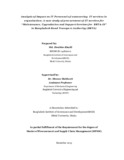| dc.contributor.advisor | Rubel, Mohammad Rabiul Basher | |
| dc.contributor.author | Dipa, Tangith Tara | |
| dc.contributor.author | Brac Business School, Brac University | |
| dc.date.accessioned | 2024-06-09T06:32:59Z | |
| dc.date.available | 2024-06-09T06:32:59Z | |
| dc.date.copyright | ©2023 | |
| dc.date.issued | 2023 | |
| dc.identifier.other | ID 20164056 | |
| dc.identifier.uri | http://hdl.handle.net/10361/23253 | |
| dc.description | This internship report is submitted in partial fulfillment of the requirements for the degree of Masters of Business Administration, 2023. | en_US |
| dc.description | Cataloged from the PDF version of the internship report. | |
| dc.description | Includes bibliographical references (page 35-36). | |
| dc.description.abstract | The goal of the current study is to investigate the relationship between entrepreneurial intention and motivational factors among female graduates. In this study, five forces are referred to as motivating forces. The purpose of this thesis is to look into female students' intentions to start their own businesses. Because the importance of the female entrepreneurship phenomenon is a developing problem, we specifically examined the women's ambition to become entrepreneur. This study aims to investigate the University graduates' intentions to start their own business in the context of Bangladesh. A total of 135 valid surveys were obtained from final-year students at various private universities, with a 60% response rate. Five theories about the relationships between motivational forces and entrepreneurial intent were put out in the current study. The investigation showed that motivation has a considerable favorable impact. The analysis's findings showed that motivation has a favorable, significant impact on each of the five dimensions. Based on the analysis's findings and earlier research, it is possible to assume that female graduates' motivations significantly affect their success. According to the study's findings, risk-taking tendency, career adaptability, and institutional learning contributes greatly to the rise of entrepreneurial self-efficacy in university graduates. The study offers significant theoretical and practical values that may be helpful to decision-makers in policy, academic institutions, and the Bangladeshi government overall. Finally, findings, restrictions, and suggested future study topics are presented. | en_US |
| dc.description.statementofresponsibility | Tangith Tara Dipa | |
| dc.format.extent | 45 pages | |
| dc.language.iso | en | en_US |
| dc.publisher | Brac University | en_US |
| dc.rights | Brac University internship reports are protected by copyright. They may be viewed from this source for any purpose, but reproduction or distribution in any format is prohibited without written permission. | |
| dc.subject | Motivation forces | en_US |
| dc.subject | Family support | en_US |
| dc.subject | Social support | en_US |
| dc.subject | Financial support | en_US |
| dc.subject | Training support | en_US |
| dc.subject | Technological support | en_US |
| dc.subject.lcsh | Financial Support Fund | |
| dc.subject.lcsh | Social networks | |
| dc.subject.lcsh | Family services | |
| dc.title | Motivation forces and its influence on female graduates entrepreneurial intentions | en_US |
| dc.type | Internship report | en_US |
| dc.contributor.department | Brac Business School, Brac University | |
| dc.description.degree | M. Business Administration | |




